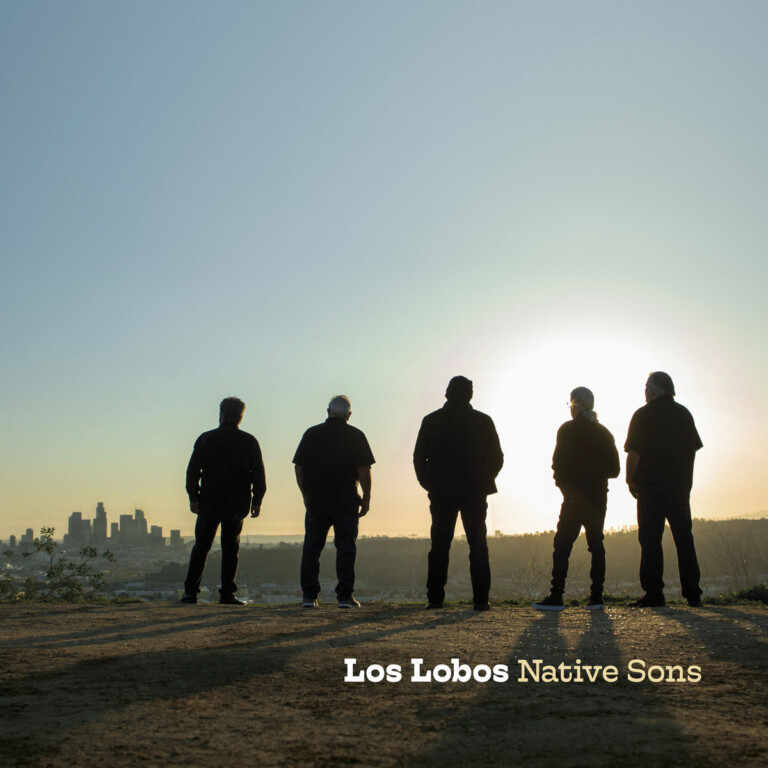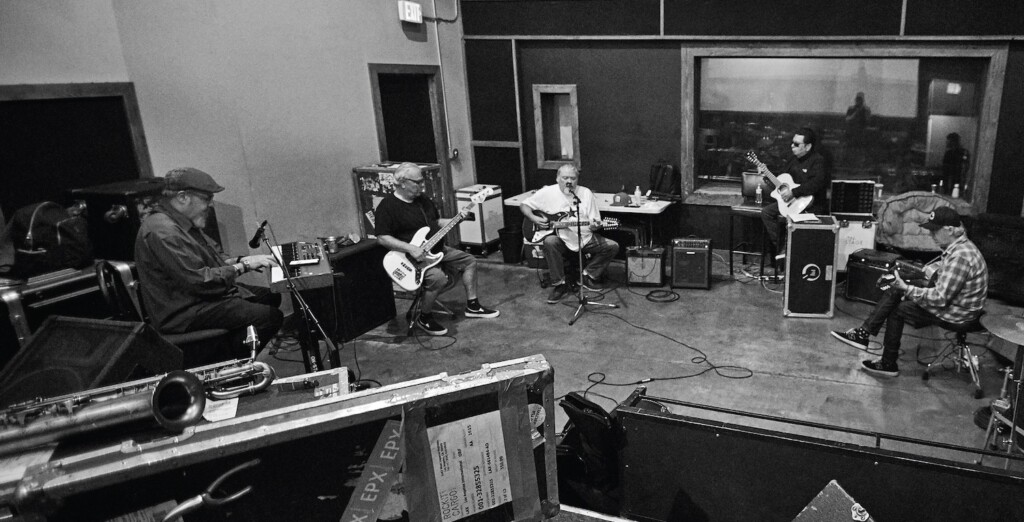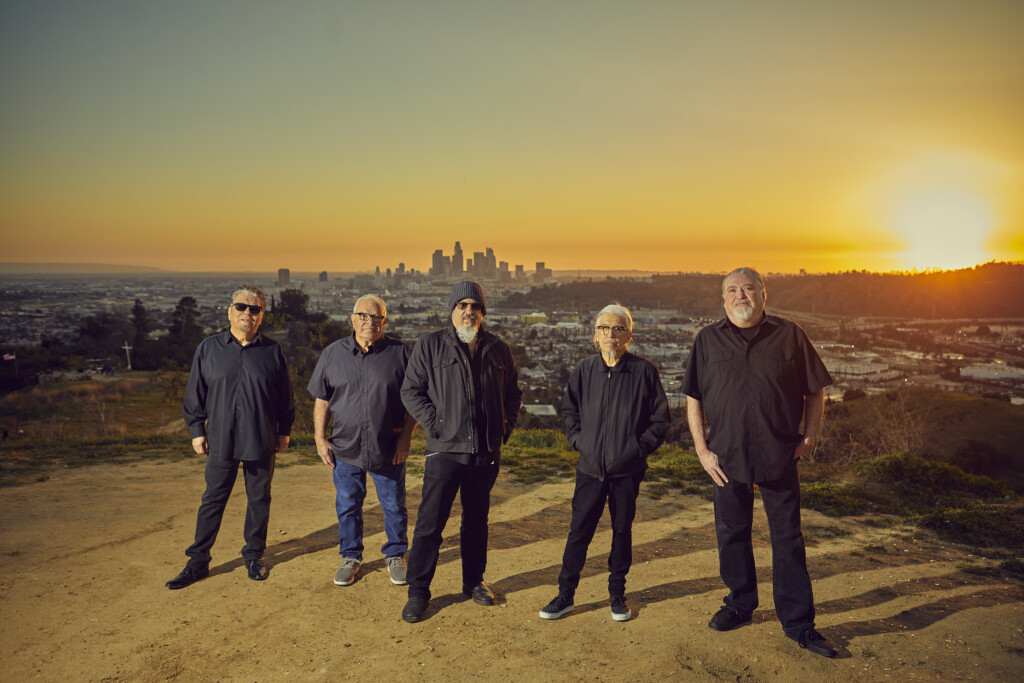MUSIC / Native Sons

Track List
- 01 Love Special Delivery
- 02 Misery
- 03 Bluebird / For What It’s Worth
- 04 Los Chucos Suaves
- 05 Jamaica Say You Will
- 06 Never No More
- 07 Native Son
- 08 Farmer John
- 09 Dichoso
- 10 Sail On, Sailor
- 11 The World Is A Ghetto
- 12 Flat Top Joint
- 13 Where Lovers Go
Native Sons
Released 2021 / New West Records
This Grammy-winning album features covers of classics from Thee Midniters, the Blasters, Willie Bobo, the Beach Boys, Lalo Guerrero, Jackson Browne, Percy Mayfield, the Blasters, and more, this record is our ode to Los Angeles. This is us – Native Sons.
Also included is the brand new song, “Native Son.”
Chart Positions
US Folk/Americana Albums #7
Awards/Recognitions
Won 2022 Grammy Award for Best Americana Album
Track By Track
Love Special Delivery
An original tune from Thee Midniters, one of the first Chicano bands out of East L.A. to make it big. They blazed the trail with such songs as “Whittier Blvd.” and “The Ballad of César Chávez.” Cesar: As a kid I’d catch Thee Midniters at Kennedy Hall on Atlantic and try to see how George (Dominguez) was playing those riffs that I couldn’t figure it out at home. Then about 20 years ago Aaron Ballesteros (Thee Midniters’ drummer) was in my home studio, recording other things. I started this riff, just goofing around, and he fell in. I said, “You know what? Why don’t we record it, man?” He did a count off and, unaccompanied, laid down the track you hear now. Perfect. First take. Conrad: In 1967 I played with Aaron in a 9-piece soul band called The Royal Checkmates, and then later in Tierra.
Misery
Originally a hit by Barrett Strong, who also had the hit “Money.” Strong co-wrote some of Motown’s biggest songs. David: This is probably one of my favorite songs on the album. Barret moved to L.A. when Motown did. Conrad: We got good old Barrence on vocals, man. Isn’t that cool? We’ve known his band The Savages forever, man. We even brought ‘em out to the West Coast to tour with us. We had a great time with those guys!
Bluebird > For What It’s Worth
When police clashed with young music club goers on the Sunset Strip in ’66, Steven Stills quickly wrote “For What It’s Worth. ” “Bluebird” was the follow-up single. Here the band flips the order and makes it a medley, with David replicating the searing guitars of both Stills (left channel) and Neil Young (right). Steve: Buffalo Springfield was a really big influence on the band. Like Los Lobos, they were polyglots unique to their time. Louie: We knew we wanted to do a Buffalo Springfield song, and ended up with two because we couldn’t decide! David: When I was a teenager, Buffalo Springfield was one of my favorite bands. I just pitched the idea: “Let’s see how close we can get to the originals. Just for the fun of it.”
Los Chucos Suaves
In 1949, “Lalo Guerrero Y Sus Cincos Lobos” recorded a 10” 78 RPM of “Marihuana Boogie/Los Chucos.” In 1995 Lalo narrated, sang, and collaborated with the five members of Los Lobos on the children’s album, Papa’s Dream. He is known as “The Father of Chicano Music.” David: Lalo Guerrero is one of my heroes. He’s the guy, man. And then we became friends over the years. He was a rock for me. We had to include a Lalo song.
Jamaica Say You Will
A timeless, mythic narrative based on Jackson Browne’s love for a girl who worked in an organic food orchard in Malibu next to the sparkling Pacific Ocean. Steve: A very delicate track. I know it’s a big favorite of Dave’s and he brought it in, but I was surprised—I mean, that’s kind of a heavy lift! Dave knocked it out of the park. Everybody did great work on it. I think we did it justice. David: Another old favorite. Great song. Louie introduced me to Jackson. We’ve worked together on projects and become friends. Louie: I used to go over to David’s house after school and listen to records with him, and this song always resonated for me—such a beautiful melody. And the narrative was something I was attracted to. The storytelling. This song in particular inspired me to write from introspection—and I saw that my songs could be personal, but I could still write them to be universal. To this day, that’s been the template.
Never No More
Percy Mayfield moved to L.A. in 1942 and became a legendary west coast bluesman, penning #1 hits like “Please Send Me Someone to Love” and “Hit the Road Jack” (soon after which Ray Charles signed him as his private songwriter). Steve: Halfway through the record we didn’t have any jump blues, which is a big part of our musical vocabulary. I was driving to the studio and called my friend Eddie Gorodetsky, who has helped us out in the past with song ideas, and that was his recommendation. I Spotified it, said “Okay, this is it!” and ten minutes later we were cutting it. Conrad: My son Jason Lozano played drums with us on it. We had fun playin’ it, that’s for sure.
Native Sons
A bit of a twist in their normal songwriting process: Louie gave Dave just the poetry (with no musical seed) and David had a melody waiting, so they crafted and wove what they had together. Conrad: Those guys are great writers. That’s all there is to it. Louie: We were walking out of the studio one day and I said, ‘Hey Dave, I have an idea. What if we wrote an original song for this record?’ He looked at me and said: “Write an original cover?” He got me on that one. My brother. A man of few words. David: The lyric is beautiful. It tells a great story. Steve: I was so happy Dave and Louie came up with it. It kinda put everything in perspective, theme-wise: Yeah, this is us—Native Sons.
Farmer John
A classic garage-rock standard penned by Don Harris and Dewey Terry, then made popular by The Premiers from San Gabriel, whose success began when their backyard rehearsals started drawing large neighborhood crowds. Cesar: This time around we did it up—we took it uptown with the original Don & Dewey version. More R&B. Up-tempo. Steve: This is one of the first songs I think I played with the guys, way back in the pre-historic age, and it’s a fun one to play.
Shout out to East L.A. Conrad: We used to do weddings with this song, back in the day. Louie: One of our first singles was The Premiere’s version of this. David: And every once in a while we’ll play the Neil Young version too!
Dichoso
From Willie Bobo’s 1966 album Feelin’ So Good. Bobo moved to Los Angeles in the early ‘70s and played with some of the biggest names in music, fusing influences from Afro-Cuban jazz, Latin, Soul and Rock, becoming an East L.A. institution. David: We got to know Willie and his son. We would do shows together with Willie and that got us closer to the Latin audience. Cesar did a great job with it. Cesar: I recorded 90% of this at my home, trying to do justice to Willie’s effortless vocals, then later we added horns and replaced my percussion with someone who really could do the job right, Camilo Quinones.
Sail On Sailor
How could you cover Southern California music without the Beach Boys? Here’s the big hit from their album, Holland. Conrad: Blondie Chaplin sang the lead on that one. He jammed with us at the Fillmore one time and we did this song. That’s how we learned it. The Beach Boys were one of my all-time favorite bands, ever since I was 13, 14 years old. “Sail On Sailor” was a song I just fell in love with. Steve: Our engineer Chris Sorem did a fantastic job capturing the mystical California vibe of this song—not an easy thing to accomplish. He really helped us hold this record together for a year across all our staggered recording sessions. Louie: Bugs Gonzalez was in town for a livestream benefit with us in the studio, and he’s a fantastic singer, so we asked him to sing on this one. We really appreciate everything Bugs did for us, everything he did with the band.
The World Is a Ghetto
This track features all-star guests Little Willie G. (who sang on WAR’s original recording), Jacob G. (Willie’s son), R&B legend/soul screamer Barrence Whitfield (of Barrence Whitfield and the Savages), and world-class percussionist Camilo Quinones. David: They’re Homeboys, man. Conrad: Cesar, Dave, and Little Willie G. on vocals. How great is that? Steve: WAR was huge to us early on. You can’t be a band from East LA and not have WAR in the conversation, so… we start with a Midniters song and Willie sings the last verse here to complete the circle.
Flat Top Joint
After a Blasters’ show at The Country Club in Reseda, Los Lobos handed Phil Alvin a cassette. “Hey! We’re a band from East L.A.!” Phil responded: “We’re from East L.A. too!” Later, the Blasters asked the band to open for them at the Whisky a Go Go, which eventually led to Los Lobos’ first label signing with Slash Records. Louie: They welcomed us in and made us feel like we were a part of their family. Steve: I was in the Blasters. I met them through Phast Phreddie, then I sat in with Los Lobos, and so… There might have been a Los Lobos without the Blasters, but we certainly wouldn’t be where we are today. They were not just inspirational, but aspirational. David: We owe ‘em a lot. We wouldn’t be anywhere without the Blasters. They were the first guys to help us out, to break into the L.A. scene and widen our audience. Conrad: We love those guys. They’re our brothers. Cesar: We’re forever thankful. That goes for all of us.
Where Lovers Go
A 1965 Chicano Soul Classic instrumental, often the last song played at the end of a late-night party. David: We’d throw it into the Dollar Dance medley when we played weddings. The guitar part is complex. The voicings change each time around. Conrad: Mario Paniagua was our road manager in Tierra when I was in the band on a southwest tour. At the time I had no idea who he was. Then one day he started talking about the Jaguars, and that’s how I found out he wrote this great song! Steve: This song’s a nice way to say goodbye.
This record is dedicated to our dear family and friends—for their love, support, and inspiration. To the brothers we’ve lost—Aaron Ballesteros, Rudy Salas, Gene Taylor—and our sister, Lynn Santos. And finally to Los Angeles—forever in our hearts, forever our home.

